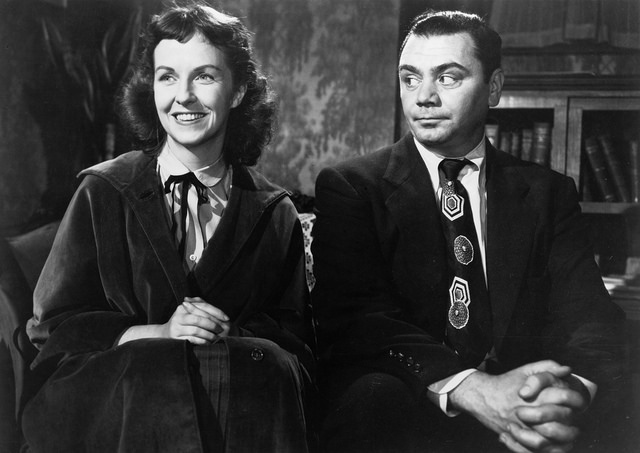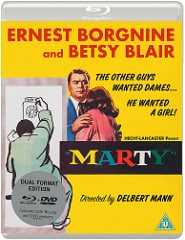
 Dir.: Delbert Mann; Cast: Ernest Borgnine, Betsy Blair, Esther Minicotti, Joe Mantell; USA 1955, 90 min.
Dir.: Delbert Mann; Cast: Ernest Borgnine, Betsy Blair, Esther Minicotti, Joe Mantell; USA 1955, 90 min.
Based on the TV play by Paddy Chayevsky, who would later script Network (1976), Delbert Mann won both the 1955 Oscar and the Palme d’Or in Cannes for his debut feature (he had directed the original TV Playhouse production with Rod Steiger and Nancy Marchand).
Ernest Borgnine won an Oscar for his thoughtful performance in this independent production (Hecht/Lancaster) which had a mini-budget of USD 300 000 but grossed over five million US Dollars at the box office. It was a follow-up to his impressive turn as the sadistic sergeant in From Here to Eternity,
Director Delbert Mann was an intellectual with a TV background, restricting his Hollywood output to a few, but memorable, features such as The Outsider (1961). His career would lead him back to TV, a medium which gave him more freedom than the Hollywood studio system. Shot in brilliant black–and-white by the veteran Joseph LaShelle (Laura, The Apartment), Marty is a chamber piece, which g set in the Bronx, during two days between Christmas and New Year’s Day: Marty (Borgnine) is an affable but rather thick-set butcher, who is mistreated both by his mother (Minicotti) and his “best friend” Angie (Mantell), a superficial misogynist. They both criticise 34–year old Marty for not being married, but would rather keep him under their control, to suit their own needs. Up to a certain point, Marty plays ball, talking in the Mickey Spillane style – but deep down he is aware of his lack if appeal to the opposite sex, his social clumsiness: he is the anti-hero, and he knows it. When he meets Isabel (Blair), a schoolteacher who has just been stood up on a blind date, the two outsiders slowly find happiness together – in spite of their shyness and awkwardness.
In an era dominated by big, colourful blockbusters from Hollywood, fighting the advent of TV with more and more sensational technical innovations and lame, simplistic plots, often featuring invincible male heroes, Marty was the antithesis to all these adventures: escapism, which never engaged the audience brains, so they would not forget where they had parked the car. Marty and Isabel were anything but the heroic winners, which sailed through the feature, but ordinary working people, whose problems were rooted in a society, where interaction between the genders where stereotype, and “a good line” was more important than a reliable character. Angie is the classical example of male insecurity, who is only too happy, to transfer his helplessness onto Marty. Having said this, Marty relies very much on the witty dialogues by Chayevsky, who identifies the conflict with the lines between the two friends: Angie trying to keep Mart at his side, as a fellow man, who never wants to grow up, and lives in the phantasy land of hard-boiled detective novels.
After winning an Oscar for her part in Marty, the Spanish director Juan Antonio Bardem would cast Blair in his subversive anti-Franco feature Calle Mayor, where she plays another unfortunate female in a story about three bored young men, one of whom pretends to be in love with her, while his friends support this illusion. Sixty years later, Marty’s humane message is still strong, and the acting is outstanding, avoiding sentimentality at all times as its simple appeal shines through.
NOW OUT ON DUAL FORMAT COURTESY OF EUREKA MASTERS OF CINEMA